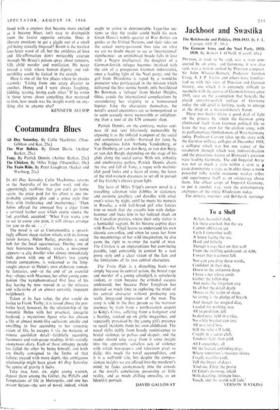Cootamundra Blues
MI Day Saturday. By Colin MacInnes. (Mac- Gibbon and Kee, 25s.)
The War Babies. By Gwen Davis. (Arthur Barker, 25s.) Tony. By Patrick Dennis. (Arthur Barker, 21s.) The Chicken. By Miles Tripp. (Macmillan, 18s.) The Train Ride. By Peter Loughran. (Seeker and Warburg, 21s.)
Ist All Day Saturday Colin Maclnnnes returns to the Australia of his earlier work and dis- appointingly reaffirms that you can't go home again; the price paid for his effort is one im- probably complex plot and a prose style that flirts with irrelevancy and incoherency: 'Then Julius offered the annoyed boy a cigar from a serrated leather case which exotic smoke the lad, gratified, accepted.' What Fate wants you to see to cause you pain, it will always arrange for you to do so. . .
The novel is set at Cootamundra, a sprawl- ingly affluent sheep station which, with its femme fatale hostess, Helen Bailey, provides a social hub for the local squattocracy. During one of their boisterous Saturday revels, a newcomer appears—a city dweller who almost immediately beds down with one of Helen's two young female companions, is welcomed as the long- sought answer to Helen's own elaborate roman- tic fantasies, and—at the end of an eventful day—elopes with Maureen, her other young com- panion (the nymphomaniacal first love of his day having by now moved in as the mistress and wife-to-be of an almost certainly impotent neighbour).
Taken at its face value, the plot would do justice to Frank Yerby; it is raised above the pot- boiler level, however, by the relationship of the romantic Helen with her practical, energetic husband, a mysterious figure who has chosen a life of almost monk-like seclusion; unable and unwilling to live according to her romantic vision of life, he escapes it via the narcotic of minute quotidian detail--faithfully recording barometer and rain-gauge readings in his weirdly anonymous diary. Each of these unhappy people has failed the other by being himself, and both are finally consigned to the limbo of that failure; treated with more depth, this ambiguous relationship might have given All Day Saturday. the centre of gravity it lacks.
Take two, four, six, eight young women, deposit them among the Glitter, the Pitfalls and Temptations of life in Metropolis, and one has instant fiction—the sort of novel, indeed, which ought to arrive in demountable, Lego-like sec- tions so that the reader could build his own. Gwen Davis's nubile quartet of War Babies are guides at the United Nations, and their rides on the sexual merry-go-round thus take on what we are no doubt meant to see as 'international' significance: an uninhibited Swede falls in love with a Negro intellectual; the daughter of a German-Jewish refugee becomes involved with the son of a prosperous German industrialist, once a leading light of the Nazi party; and the girl from Hiroshima is raped by a would-be protector who participated in the mission which delivered the first atomic bomb; only bewildered Bo Bowman, a 'refugee' from Shaker Heights, Ohio, avoids the international complications by surrendering her virginity to a homosexual hipster. Like the characters themselves, the novel's sexual encounters are so homogenised as to seem scarcely more memorable or enlighten- ing than a tour of the UN souvenir shop.
Patrick Dennis, on the contrary, makes sexi- ness (if not sex) hilariously memorable by exposing it as the inflated wampum of the social and commercial worlds—bartered for fame by the ubiquitous John Anthony Vandenberg, or Van Denberg, or van den Berg, or van den Burg, or van den Burgh, depending on the stage of his glide along the social curve. With wit, urbanity and unobtrusive pathos, Patrick Dennis charts the rise and fall of Tony, a rogue with matinee- idol good looks and a heart of stone, the latest of the mid-western dreamers to set off in pursuit of Jay Gatsby's elusive green light.
The hero of Miles Tripp's current novel is a travelling salesman who dabbles in stationery and costume jewellery and dawdles with other men's wives by night, until he meets his nemesis in Rosalie, a wild half-breed girl who fancies him so much that she assaults him with sledge- hammer and locks him in her isolated shack on the Canadian prairies, where their only visitor is a homicidal vagrant. In his bizarre captive days with Rosalie, Virgil learns to understand his own chronic cowardice, and when he saves her from the meanderings of her wild imagination, he also earns the right to re-enter the world of man. The Chicken is an unpretentious but convincing parable, kept constantly in control by a taut prose style and a clear vision of the fate and the limitations of its two central characters.
The Train Ride is a disturbing book—not simply because its central action, the brutal rape and murder of a young schoolgirl, is senselessly violent, or even because the criminal escapes undetected, but because Peter Loughran has devoted so much time to exploring the mind of his central character without producing any really integrated impression of the man. The story is told in the first person as the narrator journeys by train from a north-eastern seaport to King's Cross, suffering from a hangover and a beating, stocked up on girlie magazines, and repeatedly provoked by the young girl's presence to recall incidents from his own childhood. The novel shifts deftly from bawdy reminiscence to brutal violence, to pathos and despair, and the reader should take away from it some insight into the apparently senseless acts of violence with which newspapers and television greet us daily; this much the novel accomplishes, and it is a well-told tale, but despite the compas- sionate insights we are offered into the murderer's mind, he fades anonymously into the crowds at the novel's conclusion, possessing as little reality, and as much chilling unreality, as an Identikit portrait.
DAVID GALLOWAY






























 Previous page
Previous page